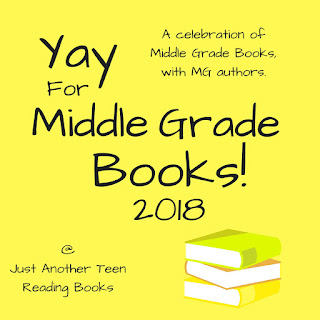Today I'm pleased to present a guest post from Anna Staniszewski! Ms. Staniszewski is the author of multiple Middle Grade books, including Once Upon a Cruise. Here's her guest post!
How NOT to Write Middle Grade Voice
Many moons ago, when I first started writing novels, I thought I was writing for adults. But over and over, people would tell me, “Your characters sound too young. They sound thirteen.” Eventually I smartened up and realized that I was supposed to be writing books for middle grade readers, and I haven’t looked back since!
I’m lucky that I have a natural middle grade voice, but voice is probably the hardest thing about writing for young readers—and even I don’t always get it right. A lot of writers think they have a “kid voice” but it actually sounds like an adult trying to sound like a kid. How do you avoid this pitfall? Here are some tips for the aspiring MG writers out there.
-Find the emotion.
Think back to when you were the age of your main character and remember what mattered to you: what felt exciting or terrifying or devastating. Then infuse that emotion into your character’s story, so that their thoughts and reactions will feel genuine and real.
-Avoiding stereotypes.
If you’re going off of what you’ve seen on TV, chances are you’ll get it wrong. There is no such thing as a typical 10 or 12 year old, and there’s no such thing as a typical MG protagonist. Instead, dig into your character to find out how they think and act and express themselves. If they’re angry, do they cry or do they scream or do they neurotically alphabetize? Creating unique, quirky humans (rather than “typical” kids or tweens) will make your characters feel layered and engaging.
-Find your character’s language.
If you’ve developed a unique character with authentic emotions, that will go a long way in making sure the character acts and talks in a believable way. But what language patterns or oddities do they have? Are they always making up weird words? Do they spout scientific facts when they’re nervous? Those types of details are way better than having your character rolling their eyes and saying “Whatever!” all the time!
-Don’t make character too articulate.
Remember that young people often have more emotions than words, so they’re not always able to articulate how they’re feeling. That’s why showing thoughts and emotions through action and gesture is so useful, especially in times of high emotion. We generally don’t expect people of any age to say exactly what they’re thinking, and it feels especially fishy if we hear characters in MG saying something like, “I was upset when you did that because it made me feel bad about myself.” It’s much more likely that a character will say, “You’re the worst!”
-Get the adults out of the picture.
This is a cliché in children’s books—kill off the parents!—but it exists for a reason. Parents often get in the way of a kid going on adventures and trying new things, but when it comes to voice, having too many adults in the story can also get in the way of your character speaking up. It can be interesting to show how your character acts/talks around adults vs. around peers or siblings, but if you have too many “helpful adults” trying to tell your character what to do or trying to speak for your character, then it takes your character’s voice away and makes the story less interesting. So if your story is crowded with adults, even if they mean well, at some point, they need to fade away so that your character can live their own story and make their own mistakes.
All really great advice! Thank you to Ms. Staniszewski for participating in this event! :)
Author bio: Anna Staniszewski is the author of several tween novels, including The Dirt Diary and Once Upon a Cruise, as well as the picture books Power Down, Little Robot and Dogosaurus Rex. She was a former Writer-in-Residence at the Boston Public Library and currently teaches at Simmons College in Boston. When she’s not writing, Anna spends her time reading, eating too much chocolate, and challenging unicorns to games of hopscotch. Visit her at www.annastan.com.
Here are a few links:




No comments:
Post a Comment
Thank you for taking the time to comment!
It makes me smile! : )